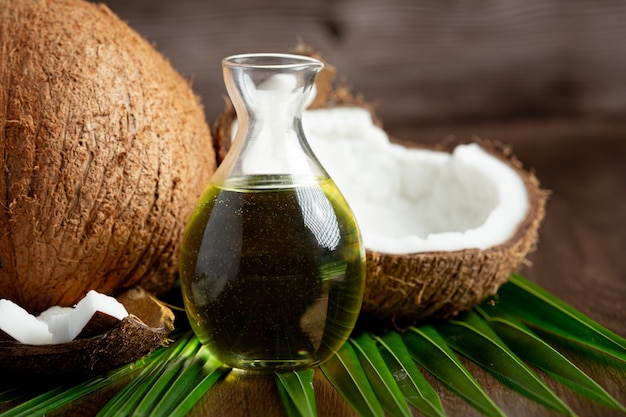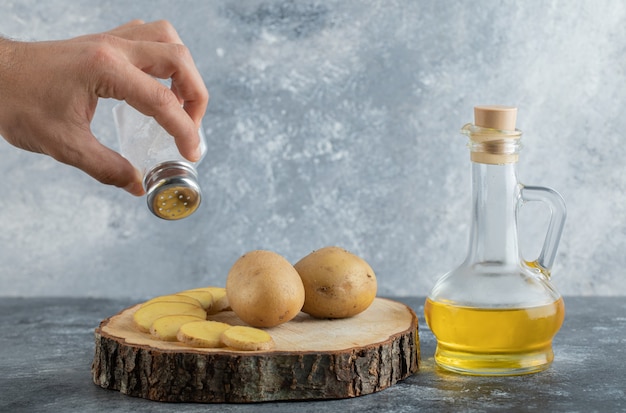(Part 1) Coconut Oil 101: The Basics

What is Coconut Oil?
Coconut oil is a type of saturated fat extracted from the dried kernel of the coconut, which is technically a drupe, not a nut! It’s a natural product that’s been used for centuries, particularly in Southeast Asian and Polynesian cuisine. You know, the kind of food that's full of flavour and makes you feel good? That's what coconut oil brings to the table.The Unique Properties of Coconut Oil
Coconut oil has a unique chemical makeup compared to other fats. It's mostly made up of medium-chain triglycerides (MCTs), which are quickly digested and absorbed by the body, unlike long-chain triglycerides found in other fats. This means that MCTs are readily used for energy, so they’re less likely to be stored as fat.Think of it this way: imagine you're running a marathon. Your body needs quick energy to keep going. MCTs are like those little energy bursts you grab along the way, while long-chain triglycerides are like those big, heavy meals that take longer to digest. You still need them for energy, but they might leave you feeling sluggish.Types of Coconut Oil
You’ll find various coconut oils in the supermarket, each with its own distinct properties. Here are the main types:- Refined Coconut Oil: This type is processed to remove impurities and give it a neutral flavor. It’s great for everyday cooking and has a higher smoke point, making it suitable for frying and baking. Think of it as the all-arounder in the kitchen.
- Virgin Coconut Oil: This oil is extracted without the use of chemicals or heat, resulting in a more natural and flavorful product. It has a delicate coconut flavor and aroma, making it a popular choice for salad dressings and sauces. It's perfect for adding a touch of coconut magic to your dishes.
- Extra Virgin Coconut Oil: The purest form of coconut oil, it’s unrefined and minimally processed, offering a stronger coconut flavor and aroma. It’s perfect for adding a distinct coconut taste to dishes. Think of this as the "gourmet" option that really brings out the coconut flavour.
Choosing the Right Coconut Oil
When it comes to choosing the right coconut oil, it all depends on your cooking needs and preferences. Here’s a quick guide:- For Everyday Cooking: Go for refined coconut oil. Its neutral flavor won’t overpower your dishes, and it has a high smoke point, which is ideal for frying and baking. It's like the trusty workhorse of your kitchen.
- For Adding Flavor: Opt for virgin or extra virgin coconut oil. These oils bring a lovely coconut taste and aroma to your dishes. You can use them in salad dressings, sauces, and even desserts. They're like the culinary artists that add a touch of flair.
- For Health Benefits: Look for organic and cold-pressed coconut oil. These options are typically free of chemicals and retain the most nutrients. They're like the healthy champions of the coconut oil world.
(Part 2) Cooking with Coconut Oil: From Frying to Baking

Frying with Coconut Oil
One of my favorite things about coconut oil is its high smoke point. This means it can withstand high temperatures without breaking down, making it perfect for frying. Think of it like this: when you heat oil to a high temperature, it can start to break down and release harmful chemicals. But coconut oil holds its own, making it a great choice for frying those delicious, crispy treats.Frying Tips:
- Heat the oil gradually: Don’t rush it! Slowly heat the oil until it shimmers and you see a light wisp of smoke rising from the surface. This ensures the oil is evenly heated and ready to cook your food perfectly.
- Don’t overcrowd the pan: Give your food enough space to cook evenly. Adding too much food to the pan will lower the temperature and make it difficult to achieve crispy results. You want your food to have room to breathe!
- Flip your food carefully: Once one side is golden brown, gently flip it over to cook the other side. Don't rush it, you want that beautiful golden brown colour on both sides.
- Drain on paper towels: This will help absorb any excess oil and make your food nice and crispy. It's the little things that make a difference!
Baking with Coconut Oil
Coconut oil is an amazing addition to baked goods! It gives them a lovely texture and a hint of coconut flavor.- Coconut oil melts easily: Make sure to soften it slightly before using it in your recipe. You can microwave it for a few seconds or simply let it sit at room temperature. You want it to be smooth and spreadable.
- Substitute it for butter or other fats: You can usually use coconut oil as a 1:1 substitute for butter or other fats in baking recipes. But remember, coconut oil has a slightly different melting point, so adjust baking times accordingly. You might need a little extra time for your treats to bake through.
- Don’t overbake: Coconut oil can burn more easily than other fats, so keep an eye on your baked goods and take them out of the oven when they’re cooked through. Keep a close watch to avoid any unwanted browning.
(Part 3) Coconut Oil in Different Cuisines

Southeast Asian Cuisine:
Coconut oil is a staple in Southeast Asian cuisine. From Thai curries to Vietnamese pho, it adds a rich and flavorful base to many dishes. Think of it as the foundation upon which delicious flavours are built. In many recipes, the oil is infused with fragrant spices and aromatics like lemongrass, ginger, and chili peppers, resulting in complex and flavorful dishes. It's like a symphony of flavours playing on your taste buds.Polynesian Cuisine:
In Polynesian cuisine, coconut oil is used extensively. It’s often combined with fish, chicken, or vegetables in traditional dishes like poi (a fermented taro root dish) and Kalua pig (slow-cooked pork). Coconut oil adds a richness and depth of flavour that perfectly complements the island ingredients.Indian Cuisine:
Coconut oil plays a significant role in South Indian cuisine. It’s used in various dishes, including curries, rice dishes, and vegetable preparations. Coconut oil's nutty flavor blends perfectly with the spices and aromas common in Indian cuisine, creating a vibrant and delicious experience.(Part 4) Coconut Oil for a Healthier Lifestyle
While coconut oil has a lot of benefits, it’s important to remember that it’s still a fat, so moderation is key. But when used appropriately, it can be a healthy and delicious addition to your diet.Heart Health:
Coconut oil is rich in lauric acid, a medium-chain fatty acid that has been linked to improved heart health. Lauric acid can raise good cholesterol (HDL) and lower bad cholesterol (LDL), which can help reduce the risk of heart disease. It's like giving your heart a helping hand.Brain Health:
The MCTs in coconut oil can help improve cognitive function and may even protect against Alzheimer’s disease. They can easily cross the blood-brain barrier and provide energy to the brain. Think of it as fuel for your brainpower.Energy Levels:
Coconut oil can provide a steady source of energy, particularly for people on a ketogenic diet. Because of its MCT content, it’s quickly digested and absorbed, leading to sustained energy levels. It's like a natural energy booster.(Part 5) Tips and Tricks for Using Coconut Oil
Let's get into some practical tips for making the most of your coconut oil!Storing Coconut Oil
Coconut oil is solid at room temperature, but it melts at around 76 degrees Fahrenheit. So, storing it in a cool, dark place is crucial. Keep it in a sealed container and make sure it’s not exposed to direct sunlight or heat. Think of it like this: you wouldn't leave your ice cream out on a hot day, would you? Treat coconut oil with the same care, and it will last longer and retain its flavour and quality.Melting Coconut Oil:
You can melt coconut oil quickly and easily in a saucepan over low heat or by microwaving it for a few seconds. Just be careful not to overheat it, as it can smoke and burn. You want it to melt gently, not become a fiery inferno.Using Coconut Oil in Salads:
Virgin or extra virgin coconut oil is fantastic for adding a unique flavor to salads. You can use it as a dressing on its own, or mix it with other ingredients like lemon juice, vinegar, and herbs. It's like a burst of sunshine on your salad bowl.(Part 6) Coconut Oil Alternatives
Not everyone enjoys the taste of coconut oil, or maybe you’re looking for other options to explore. Here are some alternatives that offer similar benefits:- Olive Oil: A Mediterranean staple, olive oil is rich in healthy monounsaturated fats. It’s a great choice for salads, baking, and sauteing. It's like a taste of the Mediterranean in your kitchen.
- avocado oil: Another healthy choice, avocado oil is high in monounsaturated fats and has a high smoke point, making it perfect for frying. It's like a creamy, avocado-infused hug for your food.
- Butter: While butter contains saturated fat, it’s also rich in vitamins A, D, E, and K. Choose grass-fed butter for a healthier option. It's like a classic comfort food staple.
(Part 7) Coconut Oil Myths Debunked
Let's tackle some common misconceptions about coconut oil.Myth 1: Coconut oil is unhealthy.
This is a common misconception. Coconut oil is a saturated fat, but it’s rich in medium-chain triglycerides (MCTs), which have unique health benefits. It’s important to consume it in moderation, just like any other fat. It's all about balance, my friend.
Myth 2: Coconut oil raises cholesterol levels.
Studies have shown that coconut oil can actually raise good cholesterol (HDL) and lower bad cholesterol (LDL), which is good for heart health. But, moderation is still key. It's like a heart-healthy superhero, but with a bit of a mischievous streak.
Myth 3: Coconut oil is only good for cooking.
Coconut oil is versatile and can be used in many ways. You can use it in salad dressings, sauces, and even as a moisturizer for your skin and hair. It's like a multi-talented performer in the kitchen and beyond.
Myth 4: Coconut oil is expensive.
You can find coconut oil at affordable prices in most supermarkets. Look for brands that offer value for money. It's like a hidden treasure waiting to be discovered.
(Part 8) Coconut Oil for Beauty and Wellness
Coconut oil isn’t just for cooking; it can also be a wonderful addition to your beauty and wellness routine!Skin Care:
Coconut oil is a natural moisturizer that can help hydrate and soften your skin. You can use it as a body lotion, facial moisturizer, or even a makeup remover. It's like a gentle caress for your skin.Hair Care:
Coconut oil is a great natural conditioner for your hair. It can help reduce frizz, add shine, and even promote hair growth. Apply it to your hair as a mask, leave it on for a few hours, and then wash it out. Think of it as a spa treatment for your hair.Other Uses:
Coconut oil can also be used to:- Soothe sunburns: Its moisturizing properties help to cool and soothe the skin. It's like a natural after-sun soother.
- Remove makeup: It's a gentle and effective makeup remover. It's like a soft touch that takes off all your makeup without harsh chemicals.
- Whiten teeth: It can help to whiten your teeth by gently removing stains. It's like a natural smile brightener.
(Part 9) Coconut Oil Recipes: A Taste of the World
Here are some of my favorite coconut oil recipes that showcase its versatility.Coconut Oil Roasted Potatoes:
Ingredients: 2 pounds potatoes, peeled and cut into 1-inch pieces 2 tablespoons coconut oil 1 teaspoon salt 1/2 teaspoon black pepperInstructions:1. Preheat oven to 400 degrees Fahrenheit (200 degrees Celsius). 2. Toss the potatoes with the coconut oil, salt, and pepper in a large bowl. 3. Spread the potatoes in a single layer on a baking sheet. 4. Roast for 30-40 minutes, or until tender and golden brown.Coconut Oil Chocolate Chip Cookies:
Ingredients: 1 cup (2 sticks) softened coconut oil 1 cup granulated sugar 1 cup packed light brown sugar 2 large eggs 1 teaspoon vanilla extract 2 1/4 cups all-purpose flour 1 teaspoon baking soda 1/2 teaspoon salt 1 cup semisweet chocolate chipsInstructions:1. Preheat oven to 375 degrees Fahrenheit (190 degrees Celsius). 2. Cream together the coconut oil and sugars until light and fluffy. 3. Beat in the eggs one at a time, then stir in the vanilla extract.4. In a separate bowl, whisk together the flour, baking soda, and salt. 5. Gradually add the dry ingredients to the wet ingredients, mixing until just combined. 6. Stir in the chocolate chips. 7. Drop by rounded tablespoons onto ungreased baking sheets. 8. Bake for 9-11 minutes, or until golden brown.Coconut Oil Thai Green Curry:
Ingredients: 2 tablespoons coconut oil 1 onion, chopped 2 cloves garlic, minced 1-inch piece ginger, minced 1 red chili pepper, finely chopped 1 (14 ounce) can coconut milk 1/2 cup green curry paste 1 cup chopped vegetables (such as broccoli, carrots, and zucchini) 1 cup cooked chicken or tofu 1/4 cup fresh basil leaves, choppedInstructions:1. Heat the coconut oil in a large saucepan over medium heat. 2. Add the onion, garlic, ginger, and chili pepper and cook until softened, about 5 minutes. 3. Stir in the coconut milk and green curry paste. 4. Bring to a boil, then reduce heat and simmer for 10 minutes. 5. Add the vegetables, chicken or tofu, and basil leaves. 6. Cook for an additional 5 minutes, or until the vegetables are tender.(Part 10) FAQs:
You’ve got questions, I’ve got answers! Here are some frequently asked questions about coconut oil.
1. Can I use coconut oil for everything?
You can use coconut oil for most cooking applications, but it's best to avoid using it for delicate dishes like sauces or those where a strong coconut flavor might not be desirable. If you’re unsure, it's always a good idea to start with a small amount and adjust as needed. Think of it as a versatile ingredient, but one that shines in certain situations.
2. Can I use coconut oil in my coffee?
Absolutely! Adding a spoonful of coconut oil to your coffee can boost your energy levels and provide a source of healthy fats. It can also add a creamy texture and a subtle coconut flavor. It's like a healthy and delicious upgrade to your morning routine.
3. Is coconut oil good for frying?
Yes, coconut oil is excellent for frying. Its high smoke point allows it to withstand high temperatures without breaking down, resulting in crispy and delicious food. It's like the secret weapon for achieving that perfect golden-brown crust.
4. Can I store coconut oil in the refrigerator?
Yes, you can store coconut oil in the refrigerator to keep it solid at all times. However, it’s important to bring it to room temperature before using it as it can be difficult to work with when cold. Just remember to give it some time to soften up before using it.
5. Is coconut oil good for people with allergies?
Coconut oil is generally safe for most people with allergies, but it’s always a good idea to check the label for any potential cross-contamination. If you have a known allergy to coconuts or other tree nuts, you should avoid using coconut oil. It's always best to err on the side of caution when it comes to allergies.
Conclusion:
There you have it, a comprehensive guide to cooking with coconut oil. As you’ve seen, it’s versatile, delicious, and surprisingly healthy when used wisely. So, give it a go, experiment with different recipes, and discover the amazing things you can create in the kitchen with this versatile ingredient. You might be surprised by the delicious results and the wonderful benefits it can bring to your meals and well-being! Happy cooking!Everyone is watching

Corn on the Cob: The Ultimate Guide to Perfectly Cooked Ears
Healthy MealsAh, corn on the cob. Just the name evokes images of sunny days, barbecues, and that sweet, juicy flavour that ...

Perfect Pork Roast Oven Cooking Time: A Guide to Delicious Results
Healthy MealsThere's something truly satisfying about a perfectly roasted pork. The aroma alone is enough to make your mout...

Ham Cooking Time: How Long to Bake, Smoke, or Boil a Delicious Ham
Healthy MealsAh, ham. It's a classic, isn't it? A real crowd-pleaser, especially around holidays. And when done right, it'...

Scallops: The Ultimate Guide to Perfect Cooking
Healthy MealsAh, scallops. Those delicate, sweet, and utterly delicious morsels of the sea. They hold a special place in my...

Spaghetti Squash: The Ultimate Guide to Cooking and Serving
Healthy MealsRemember that time you saw spaghetti squash at the supermarket, looking all bumpy and strange, and thought, "W...
